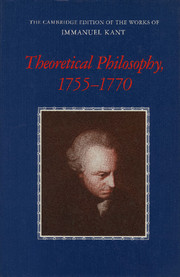Book contents
- Frontmatter
- Contents
- General editors' preface
- Preface
- Guide to abbreviations
- General introduction
- Introductions to the translations
- Résumés of the works
- A NEW ELUCIDATION OF THE FIRST PRINCIPLES OF METAPHYSICAL COGNITION (1755)
- THE EMPLOYMENT IN NATURAL PHILOSOPHY OF METAPHYSICS COMBINED WITH GEOMETRY, OF WHICH SAMPLE I CONTAINS THE PHYSICAL MONADOLOGY (1756)
- AN ATTEMPT AT SOME REFLECTIONS ON OPTIMISM (1759)
- THE FALSE SUBTLETY OF THE FOUR SYLLOGISTIC FIGURES (1762)
- §1 General concept of the nature of syllogisms
- §2 Concerning the supreme rules governing all syllogisms
- §3 Concerning pure and mixed syllogisms
- §4 In the so-called first figure only pure syllogisms are possible. In the remaining three figures nothing but mixed syllogisms is possible
- §5 The logical division of the four syllogistic figures is a piece of false subtlety
- §6 Concluding reflection
- THE ONLY POSSIBLE ARGUMENT IN SUPPORT OF A DEMONSTRATION OF THE EXISTENCE OF GOD (1763)
- ATTEMPT TO INTRODUCE THE CONCEPT OF NEGATIVE MAGNITUDES INTO PHILOSOPHY (1763)
- INQUIRY CONCERNING THE DISTINCTNESS OF THE PRINCIPLES OF NATURAL THEOLOGY AND MORALITY (1764)
- M. IMMANUEL KANT'S ANNOUNCEMENT OF THE PROGRAMME OF HIS LECTURES FOR THE WINTER SEMESTER 1765 — 1766 (1765)
- DREAMS OF A SPIRIT-SEER ELUCIDATED BY DREAMS OF METAPHYSICS (1766)
- CONCERNING THE ULTIMATE GROUND OF THE DIFFERENTIATION OF DIRECTIONS IN SPACE (1768)
- ON THE FORM AND PRINCIPLES OF THE SENSIBLE AND THE INTELLIGIBLE WORLD [INAUGURAL DISSERTATION] (1770)
- Factual notes
- Bibliographies of editions and translations
- Glossary
- Biographical-bibliographical sketches of persons mentioned by Kant
- Index
§6 - Concluding reflection
Published online by Cambridge University Press: 18 December 2014
- Frontmatter
- Contents
- General editors' preface
- Preface
- Guide to abbreviations
- General introduction
- Introductions to the translations
- Résumés of the works
- A NEW ELUCIDATION OF THE FIRST PRINCIPLES OF METAPHYSICAL COGNITION (1755)
- THE EMPLOYMENT IN NATURAL PHILOSOPHY OF METAPHYSICS COMBINED WITH GEOMETRY, OF WHICH SAMPLE I CONTAINS THE PHYSICAL MONADOLOGY (1756)
- AN ATTEMPT AT SOME REFLECTIONS ON OPTIMISM (1759)
- THE FALSE SUBTLETY OF THE FOUR SYLLOGISTIC FIGURES (1762)
- §1 General concept of the nature of syllogisms
- §2 Concerning the supreme rules governing all syllogisms
- §3 Concerning pure and mixed syllogisms
- §4 In the so-called first figure only pure syllogisms are possible. In the remaining three figures nothing but mixed syllogisms is possible
- §5 The logical division of the four syllogistic figures is a piece of false subtlety
- §6 Concluding reflection
- THE ONLY POSSIBLE ARGUMENT IN SUPPORT OF A DEMONSTRATION OF THE EXISTENCE OF GOD (1763)
- ATTEMPT TO INTRODUCE THE CONCEPT OF NEGATIVE MAGNITUDES INTO PHILOSOPHY (1763)
- INQUIRY CONCERNING THE DISTINCTNESS OF THE PRINCIPLES OF NATURAL THEOLOGY AND MORALITY (1764)
- M. IMMANUEL KANT'S ANNOUNCEMENT OF THE PROGRAMME OF HIS LECTURES FOR THE WINTER SEMESTER 1765 — 1766 (1765)
- DREAMS OF A SPIRIT-SEER ELUCIDATED BY DREAMS OF METAPHYSICS (1766)
- CONCERNING THE ULTIMATE GROUND OF THE DIFFERENTIATION OF DIRECTIONS IN SPACE (1768)
- ON THE FORM AND PRINCIPLES OF THE SENSIBLE AND THE INTELLIGIBLE WORLD [INAUGURAL DISSERTATION] (1770)
- Factual notes
- Bibliographies of editions and translations
- Glossary
- Biographical-bibliographical sketches of persons mentioned by Kant
- Index
Summary
Our discussions have established the following points: that the supreme rules governing all syllogisms lead directly to that order of concepts which is called the first figure; that all other transpositions of the middle term only yield valid inferences if, by means of easy and immediate inferences, they lead to such propositions as are connected in the simple order of the first figure; that it is impossible to draw simple and unmixed inferences in more than one figure, for it is only ever the first figure which, concealed in a syllogism by means of covert inferences, has the power to generate the conclusion, with the changed position of the terms merely occasioning a deviation, shorter or longer as the case may be, which has to be followed if one is to understand how the conclusion has been reached; and that the division of the figures in general, in so far as they are supposed to contain inferences which are pure, unmixed and free from interpolated inferences, is false and impossible. It is easy to see from our explanations – and for that reason I do not propose to dwell on it – that the universal fundamental rules which govern all syllogisms contain the special rules of the so-called first figure; it is also easy to see that, given the conclusion and the middle term, one can instantly convert any syllogism belonging to one of the other figures into the first simple figure, without the futile tediousness of the formulae of reduction, so that either the conclusion itself or a proposition from which the conclusion follows by immediate inference, can be inferred.
I do not wish to conclude this reflection without adding some remarks which may be of some considerable use in other connections.
Firstly, then I would say: a distinct concept is only possible by means of a judgement, while a complete concept is only possible by means of a syllogism.
- Type
- Chapter
- Information
- Theoretical Philosophy, 1755–1770 , pp. 102 - 106Publisher: Cambridge University PressPrint publication year: 1992

